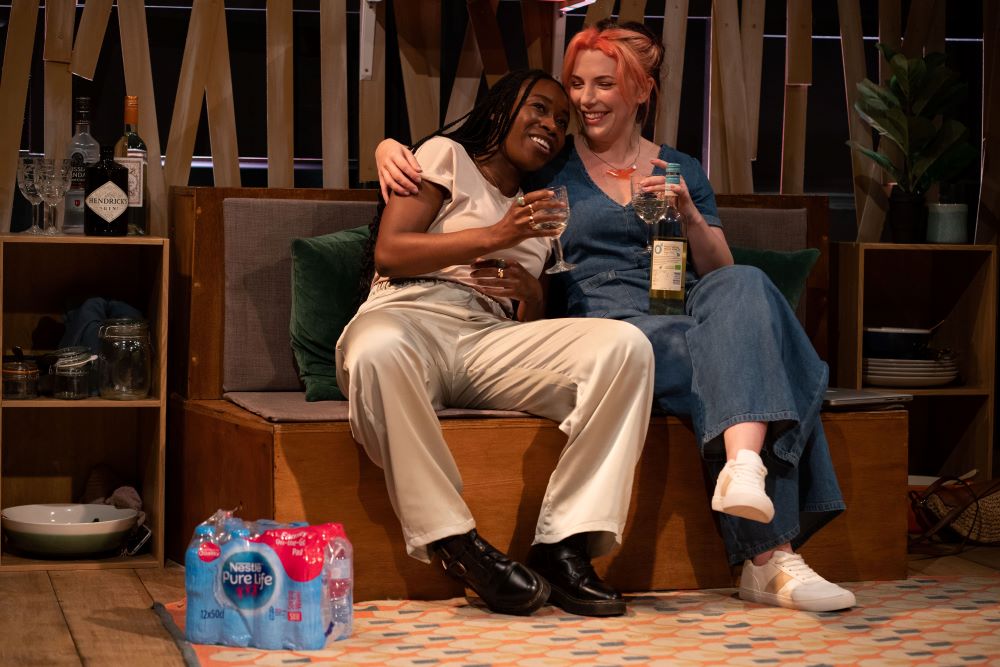Despite its painfully relevant title, How To Survive An Apocalypse was written in 2016. If only Canadian playwright Jordan Hall knew, eh? The end times aren’t just creeping but hurtling towards us, these days. Luckily for those weary of Covid stories, this play is more about millennials sensing impending doom, and how that experience impacts upon their personal relationships, than the doom itself. Jimmy Walters’ production for the charmingly intimate Finborough Theatre sparks intriguing ideas on which it doesn't quite fully follow through.
Jen (Kristin Atherton, who really knows how to wear a jumpsuit) edits a lifestyle magazine, Belle Vie, which is in dire financial straits. The chair of the board has sent her a saviour in the form of Bruce (Ben Lamb, pictured below, with Atherton), a man whose idea of a good time is “killing an elk with your teeth”. He’s a survivalist, preparing for what he sees as the inevitable disaster that will wipe out most of human society. Jen becomes transfixed by the idea and persuades her husband, out-of-work game designer Tim (Noel Sullivan), that they should be survivalists too. She later sets up her recently separated best friend Abby (Christine Gomes) with Bruce, in an effort to stave off her own attraction to him. Things come to a head, as they do, on a group camping trip.
 Kudos to the cast for maintaining Vancouver accents through two hours of stage time. Jen tends to speak loudly, although whose choice that is is unclear. Atherton’s best moments are when she’s allowed to be quiet, sharing long looks with her three castmates. Lamb is likeable – perhaps too likeable, as Bruce’s assertions that he’s an “asshole” don’t ring true. Sullivan uses his big brown puppy eyes to great effect, but gives Tim a spine behind his soft exterior. Gomes is underutilised; Abby is the least rounded of the four characters, mostly existing as a foil to Jen. Gomes nonetheless makes her sympathetic and sparky. Aren’t you not eating gluten, she reminds Jen, who is stock-piling flour, setting up a magnificent punchline: “The revolution will not be gluten-free!”
Kudos to the cast for maintaining Vancouver accents through two hours of stage time. Jen tends to speak loudly, although whose choice that is is unclear. Atherton’s best moments are when she’s allowed to be quiet, sharing long looks with her three castmates. Lamb is likeable – perhaps too likeable, as Bruce’s assertions that he’s an “asshole” don’t ring true. Sullivan uses his big brown puppy eyes to great effect, but gives Tim a spine behind his soft exterior. Gomes is underutilised; Abby is the least rounded of the four characters, mostly existing as a foil to Jen. Gomes nonetheless makes her sympathetic and sparky. Aren’t you not eating gluten, she reminds Jen, who is stock-piling flour, setting up a magnificent punchline: “The revolution will not be gluten-free!”
Ceci Calf’s set looks like a minuscule IKEA showroom apartment breaking into shards, just like Jen and Tim’s relationship (and maybe the world). Every inch is taken up by essential millennial props – a Le Creuset casserole dish plays a starring role – as if Jen and Tim live in one of those tiny houses that Americans are fond of building. Adam King lights their faces beautifully in the final scene, where they contemplate whether trying to reconstruct the rubble of their marriage is worth it.
 It’s easy to see why the Finborough has revived this play now – the climate crisis has accelerated alarmingly since 2016, and Jen’s attempts to stockpile essentials on a shoestring budget are depressingly familiar. There’s a sort of reflexive chuckle-cum-wince when "pandemic" crops up in Tim’s list of potential catastrophes. You’re tempted to let the characters know that it’s been both better and worse than they imagined. Hall’s language is preachy, verging on the polemic, which makes some of the scenes feel like badly-planned seminars. But the tangled nature of Jen and Tim and Abby and Bruce’s lives suits the theatre’s small space; form and function chime.
It’s easy to see why the Finborough has revived this play now – the climate crisis has accelerated alarmingly since 2016, and Jen’s attempts to stockpile essentials on a shoestring budget are depressingly familiar. There’s a sort of reflexive chuckle-cum-wince when "pandemic" crops up in Tim’s list of potential catastrophes. You’re tempted to let the characters know that it’s been both better and worse than they imagined. Hall’s language is preachy, verging on the polemic, which makes some of the scenes feel like badly-planned seminars. But the tangled nature of Jen and Tim and Abby and Bruce’s lives suits the theatre’s small space; form and function chime.
Ben Brantley of the New York Times calls the Finborough “tiny but mighty”. How To Survive An Apocalypse is certainly not tiny in its scope, and its might only bursts through every so often. Hall’s scope is too big for her to give us any satisfying conclusions, but maybe that’s the point: as Jen says, the scariest thing an apocalypse can do is not happen.















Add comment